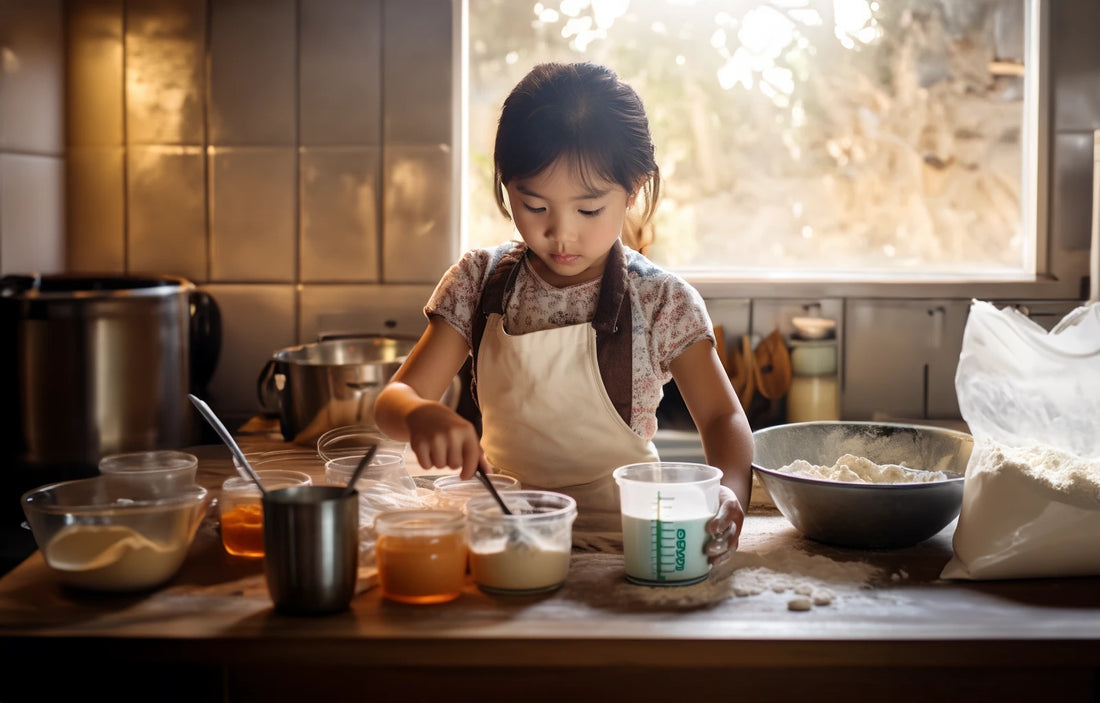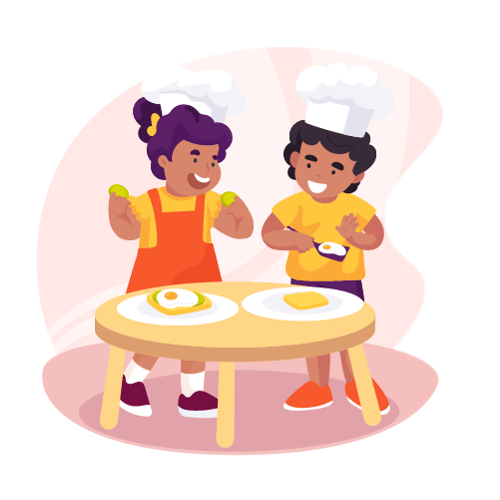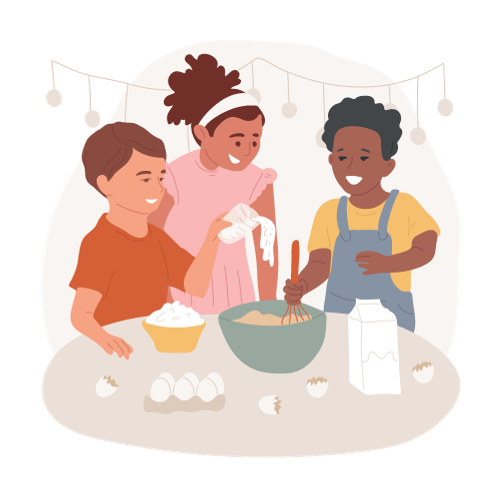As parents, we often focus on providing our children with the best academic and extracurricular opportunities to support their early development. However, one area that is often overlooked but holds immense potential for fostering crucial life skills is culinary education such as learning to bake and cook.
The act of cooking and preparing food not only enhances a child's physical health, but also stimulates their cognitive and emotional growth in profound ways. From learning basic math through measuring ingredients to developing fine motor skills while chopping vegetables, culinary education offers a holistic approach to early childhood development.
In this article, we explore the ways in which culinary education through baking and cooking contribute to early childhood development, influencing cognitive, social, emotional and motor skill development in ways that leave a lasting impact.
Cognitive Growth
Logic and Problem Solving
Furthermore, cooking and baking provide opportunities for children to practice problem-solving and critical thinking skills. When a child is tasked with following a recipe, they must analyse the steps, measure ingredients, and make decisions along the way. This process encourages them to think critically about the order of tasks and how different components come together to create a final product. Additionally, when faced with challenges such as adjusting seasoning or rescuing overcooked pasta, children learn to problem-solve in real time, fostering resilience and adaptability.
Science Concepts
Culinary education in early childhood not only enhances children's cooking skills but also provides a unique opportunity to explore the principles of science. When children engage in simple kitchen experiments like mixing ingredients or observing the transformation of raw food into cooked meals, they are learning about cause and effect in a tangible way. Through hands-on experience in baking and cooking, children can better understand concepts such as chemical reactions, heat transfer, and changes in states of matter. For example, through baking cookies, children can witness how different temperatures and types of flour affect the final product.
Measurements and Math
For children, learning to bake and cook provides a unique opportunity to enhance their math skills in an engaging and practical way. Through hands-on activities such as measuring ingredients, counting pieces of fruit, or dividing portions, children can actively apply foundational math concepts.
For example, when a child measures flour or sugar for a recipe, they are learning about units of measurement and fractions. They also learn about proportions and ratios as they mix different ingredients together to create a dish. These real-life applications allow them to grasp abstract mathematical ideas more effectively than traditional classroom methods.

Social Development
Teamwork in the Kitchen
Culinary education plays a crucial role in enhancing teamwork in the kitchen. Through baking and cooking classes for kids and interactive activities, children learn to work together towards a common goal. By engaging in tasks such as measuring ingredients and stirring mixtures, kids develop essential teamwork skills that are invaluable for their future endeavors.
Furthermore, culinary classes for kids fosters a sense of responsibility and collaboration among young learners. As they navigate through recipes and create dishes together, children learn to communicate effectively, delegate tasks, and support each other's efforts. This not only enhances their cooking abilities but also cultivates valuable life skills that extend beyond the kitchen. Such experiences help them understand the importance of cooperation and respect for others' contributions, laying a strong foundation for successful teamwork in various aspects of their lives.
Cultural Connections
Learning to bake and cook from young plays a significant role in enhancing early childhood cultural connections by fostering an appreciation for diverse cuisines and traditions. It provides children with the opportunity to explore different flavors, ingredients, and cooking techniques from various cultures, allowing them to develop a deeper understanding of the world around them. Through hands-on experiences in the kitchen, children can learn about the cultural significance of food and its role in bringing communities together.
Motor Skill Development
Fine Motor Skills
Learning to bake and cook from young can greatly benefit children's fine motor skills. Engaging in activities such as cutting, mixing, and pouring helps to develop their hand-eye coordination and manual dexterity. As they measure ingredients or knead dough, children learn to refine their pincer grasp and hand strength, fostering greater control over their movements. These practical tasks require precision and meticulousness, encouraging the development of fine motor skills in a fun and interactive way.
Sensory Exploration
Furthermore, baking and cooking promotes sensory exploration, allowing children to connect with various textures and learn how to manipulate different tools effectively. This hands-on experience contributes to the refinement of their tactile sensitivity and spatial awareness. From shaping dough to decorating cookies, these activities demand attention to detail and concentration, contributing positively towards the overall enhancement of children's motor skills and sensory perception.

Emotional Well-Being
Building Confidence and Responsibility
Baking and cooking offer children the opportunity to explore their creativity while developing essential skills that build confidence from a young age. As they measure ingredients and follow recipes, children learn to make decisions independently, fostering a sense of accomplishment and self-assurance, which are crucial for building confidence. The act of preparing meals also instills a sense of responsibility and competence in young learners, as they see the tangible results of their efforts and take pride in their ability to create a dish from scratch.
Expressive Outlets
Moreover, culinary education can be a powerful avenue for children to express themselves creatively and artistically. Baking and cooking encourages children to experiment with new flavours and textures, broadening their palate and cultivating an openness to trying new experiences. This also enables children to unleash their imagination in the kitchen, transforming ordinary ingredients into mouthwatering dishes that reflect their personal style and preferences.

The benefits of culinary education for early childhood development are undeniable. Through hands-on experiences in the kitchen, children are able to enhance their cognitive, motor, social and emotional development in ways that leave a lasting impact. Therefore, it is essential for parents to recognise the value of teaching children to bake and cook in order to nurture well-rounded individuals from an early age.
Watch out for these 5 signs that your child is ready for baking and cooking, and learn how to get your kids involved in baking and cooking at home. Alternatively, consider the benefits of signing up for kids baking and cooking classes instead.
Culinary education at LUNA Kids is not just about baking and cooking; it's about purposeful learning that fosters early childhood development. Join us in the kitchen, where every knead, mix, and sprinkle is a purposeful step towards a brighter and more flavourful future for your child. Let's bake and cook with a purpose, unlocking the full potential of early childhood development through the joy of creating something delicious together.
Explore our kids baking classes and cooking classes for kids and sign them up today.



